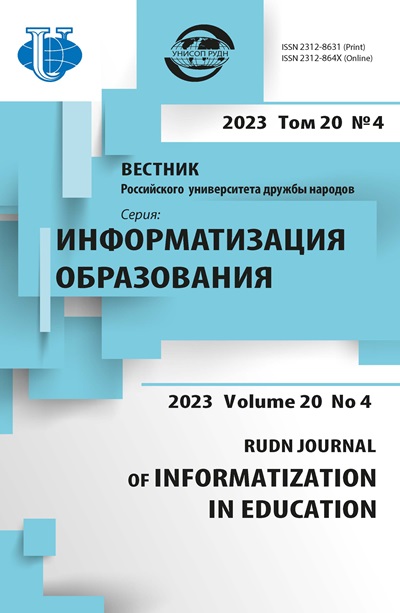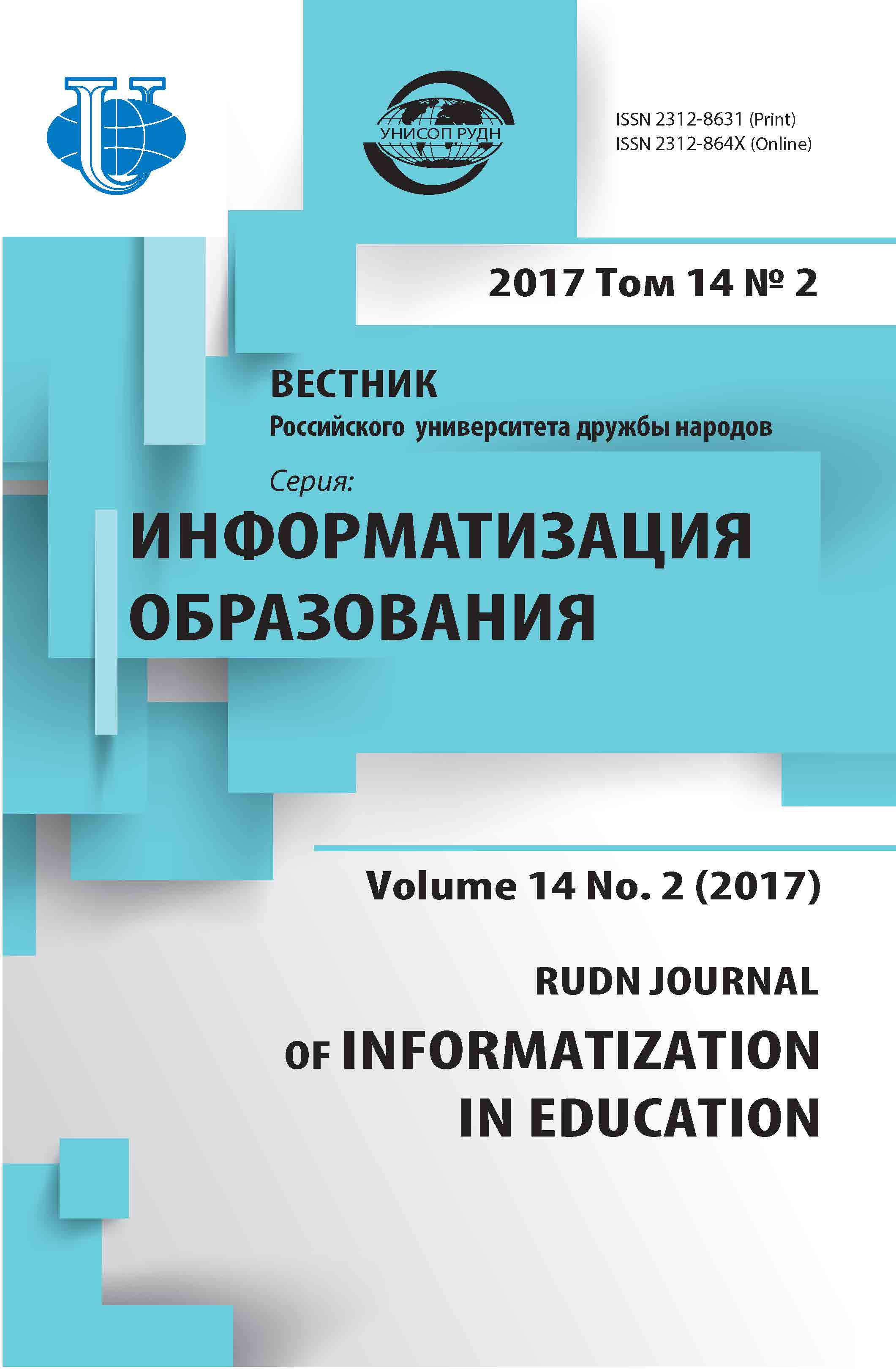ACTUALIZATION OF THE MATHEMATICAL COMPONENT IN COMPUTER SCIENCE LESSONS
- Authors: Lyubvin IN1
-
Affiliations:
- School No. 224
- Issue: Vol 14, No 2 (2017)
- Pages: 161-166
- Section: TEACHING COMPUTER SCIENCE
- URL: https://journals.rudn.ru/informatization-education/article/view/16728
- DOI: https://doi.org/10.22363/2312-8631-2017-14-2-161-166
Cite item
Full Text
Abstract
This article discusses the type of the task of the USE in computer science with the point of view of the mathematical apparatus. When analyzing assignments, graphic and algebraic approaches are used to solve problems. Special attention is given in the article to the urgency of mathematical preparation in the question of the concept of the development of mathematical education in the Russian Federation. One of the purposes of the present concept is the popularization of mathematical knowledge and mathematical education, and the application of this knowledge in other fields. Implementation of the conception implies the conclusion of mathematical education to a new level, which will improve the teaching of other disciplines. In addition, it can be shown that the allocation of more attention to mathematics on other subjects makes it possible to improve the quality of education in computer science, in particular. The same concept helps to create and apply new mechanisms for the development of education, which can be used in other subjects. The purpose of this article is to attract the educational community (both teachers and students) to use more mathematical tools in solving tasks in computer science. The examples given in the article show that this approach makes it possible to solve problems more rationally and quickly.
About the authors
I N Lyubvin
School No. 224
Author for correspondence.
Email: mania@yandex.ru
teacher of informatics of school No. 224 of the city of Moscow
Leningradskoe shosse, 30, Moscow, Russia, 125212References
- Kontseptsiya razvitiya matematicheskogo obrazovaniya v Rossiiskoi Federatsii / utv. Rasporyazheniem Pravitel’stva RF ot 24.12.2013 g. № 2506-r [The concept of the development of mathematical education in the Russian Federation / By the order of the Government of the Russian Federation of December 24, 2013 № 2506-r]. URL: http://base.garant.ru/70552506/
- Federal’nyj gosudarstvennyj obrazovatel’nyj standart osnovnogo obshchego obrazovaniya [Federal state educational standard of the main general education]. URL: http://standart.edu.ru/
- Grigorev S.G. Grinshkun V.V. Zaslavskaya O.Yu. Levchenko I.V. Realizaciya razvivayushchego potenciala obucheniya informatike v usloviyah vnedreniya gosudarstvennyh obrazovatelnyh standartov vtorogo pokoleniya [Realization of the developing potential of training in informatics in the conditions of introduction of the state educational standards of the second generation] // Vestnik Rossijskogo universiteta druzhby narodov. Serija: Informatizacija obrazovanija [Bulletin of the Russian university of friendship of the people. Education Informatization series]. 2010. No. 1. Pp. 13—26.
- Grinshkun V.V. Zaslavskaya O.Yu. Istoriya i perspektivy razvitiya programm informatizacii obrazovaniya [History and prospects of development of programs of informatization of education] // Vestnik Moskovskogo gorodskogo pedagogicheskogo universiteta. Serija «Informatika i informatizacija obrazovanija» [Bulletin of the Moscow city pedagogical university. «Informatics and Informatization of Education» series]. 2011. No. 1 (21). Pp. 5—14.
- Zaslavskaya O.Yu. Model algoritm i soderzhanie podgotovki uchitelya informatiki v sovremennyh usloviyah [Model, algorithm and content of training of the teacher of informatics in modern conditions] // Vestnik Rossijskogo universiteta druzhby narodov. Serija: Informatizacija obrazovanija [Bulletin of the Russian university of friendship of the people. Education Informatization series]. 2007. No. 4. Pp. 24—30.
- Zaslavskaya O.Yu Vozmozhnosti servisov google dlya organizacii uchebno-poznavatelnoj deyatelnosti shkolnikov i studentov [Possibilities of Google services for the organization of educational cognitive activity of school students and students] // Informatika i obrazovanie [Informatics and education]. 2012. No. 1 (230). Pp. 45—50.
- Zaslavskaya O.Yu. Osobennosti povysheniya kvalifikacii uchitelej v oblasti ispolzovaniya internet-servisov novogo pokoleniya [Features of professional development of teachers in the field of use of Internet services of new generation] // Vestnik Moskovskogo gorodskogo pedagogicheskogo universiteta. Serija «Informatika i informatizacija obrazovanija» [Bulletin of the Moscow city pedagogical university. «Informatics and Informatization of Education» series]. 2012. No. 1(23). Pp. 76—86.
- Zaslavskaya O.Yu. Podhody, trebovaniya i tendencii v podgotovke uchitelej informatiki k attestacii pedagogicheskih kadrov v usloviyah informatizacii [Approaches, requirements and tendencies in training of teachers of informatics for certification of pedagogical shots in the conditions of informatization] // Vestnik Rossijskogo universiteta druzhby narodov. Serija: Informatizacija obrazovanija [Bulletin of the Russian university of friendship of the people. Education Informatization series]. 2013. No. 1. Pp. 5—13.
- Zaslavskaya O.Yu., Ivanova O.V., Kravets O.Ya., Rudinsky I.D., Stolbova I.D. Kompetentnostnyj podhod k organizacii obrazovatelnogo processa i nekotorye voprosy adaptivnogo-upravleniya uchebnoj deyatelnostyu [Competence-based approach to the organization of educational process and some questions of adaptive management of educational activity]: monografiya. Voronezh: Nauchnaya kniga, 2011. 204 p.
- Otkrytyi bank zadanii EGE [Open bank of tasks USE]. URL: http://85.142.162.119/os11/xmodules/qprint/index.php
- Federal’nyi institut pedagogicheskikh izmerenii [Federal Institute of Pedagogical Measurements]. URL: http://www.fipi.ru/ege-i-gve-11/demoversii-specifikacii-kodifikatory
- Zaslavskaya O.Yu. Components of teacher s management competency knowledge and skills activity functional areas // American journal of pedagogy and education / Science Book Publishing House: LLC Printed in the USA. 2013. No. 1. Pp. 13—16.
















